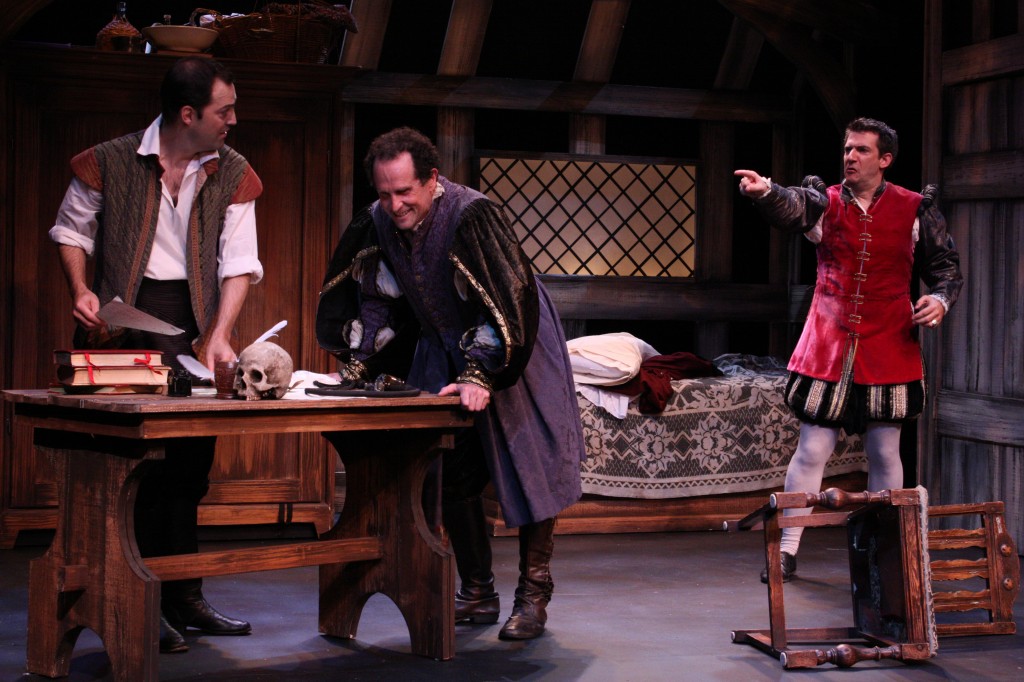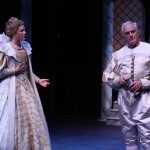
Will Shakespeare, Ben Jonson and John Marston (Stafford Clark-Price, Jeremiah Kissel and John Kuntz) Photo by Boston Playwrights' Theatre
Mortal Terror by Robert Brustein, Suffolk University & Boston Playwrights’ Theatre, The Modern Theatre at Suffolk University, 9/15/11-10/2/11, http://www.bu.edu/bpt/.
Reviewed by Becca Kidwell
(Boston, MA) Each generation lives in fear of war, conflicts, pain, and death. Each person has to choose how they are going to react to the conflict. Mortal Terror addresses this puzzlement in Elizabethan garb. Rowdy writers, absolute rulers, and crazy conspirators throw words back and forth until every character must face his own compass and decide on where he stands.
Will Shakespeare, the toast of Renaissance England’s theatre scene, gets the opportunity to write a play to legitimize King James’ rule. Shakespeare’s contemporaries, Sir John Harrington, Ben Jonson, and John Marston, discuss with Shakespeare the implications of Shakespeare writing this play. Will, played by Stafford Clark-Price, stays true to history by playing the middle road and trying to not cause waves. However, the Scottish play consumes him until he realizes that neutrality is only an option in private quarters, not in the public domain.
Clark-Price’s Shakespeare laughs in the face of the stuffy historical portraits. Stafford Clark-Price’s earthy performance gives life to a hard working professional who is simply trying to make his way in the world unlike Jonson, Harrington, Marston, King James, and Guy Fawkes who all seem to be caricatures. Shakespeare speaks to the struggles of the common man–between practicality and principle.
Jeremiah Kissel delivers an articulate and charismatic Ben Jonson. Jonson matches wit with Shakespeare, but also knows the price of working for the monarchy. Sir John Harrington, portrayed by Dafydd ap Rees, admonishes Shakespeare the lack of political commentary in Will’s plays. John Kuntz is the loquacious John Marston who suffers from Ben Jonson’s constant derision. While he tries Jonson’s patience, Jonson enjoys the abandon that Marston lives with.
Georgia Lyman (with the help of costume designer Rachel Padula Shufelt) enters as the beautiful princess that little girls dream about. Georgia Lyman illustrates that the business transaction that takes place to become a queen is far from glamorous. Lyman’s regal presence makes her plight for survival both pitiable and understandable. Michael Hammond’s King James postures and orders but knows that his kingdom is on shaky ground–after all, the last two monarchs faced numerous coups and they had direct lineage to the throne. He needs substantiation and looks for it in the procurement of Macbeth.
Mortal Terror is clever and historically accurate (for what anyone knows). The biggest impediment to the plot, however, is Brustein’s own love of history. As with his previous play, The English Channel, Brustein allows the underlying historical incidents’ to hinder the main story line. The Gunpowder Plot of 1605 fills the air and affects all action that happens in the story. Yet, the action would be better served by discussions among the main characters and only small intrusions by the minor players. Both Mortal Terror and The English Channel‘s plots provide conscientious and compelling stories of Shakespeare’s life. Robert Brustein only needs to listen to Shakespeare’s treatment of history to find his balance.
Mortal Terror provides a realistic glimpse into Shakespeare’s life. Its subtext parallels the struggles against fear that everyone experience. Despite the uneven pacing, Mortal Terror is not “a tale told by an idiot full of sound and fury signifying nothing”; Mortal Terror has much promise and strength in its narrative.

